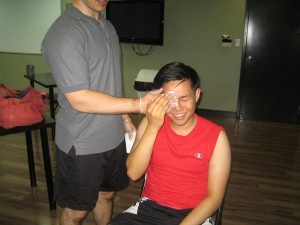An individual with an eye allergy typically suffer from symptoms such as teary, red and itchy eyes. There are preventive measures that can help minimize the symptoms experienced by the individual. In some cases, medications are usually given to effectively manage the symptoms.
Over-the-counter eye drops and medications
Tear substitutes
Artificial tears can temporarily wash out allergens from the eye and moisten them which often turn dry when irritated and red. These drops can be stored in the refrigerator to provide an added soothing effect and comfort. In addition, these drops are safe to use as often as needed.
Decongestants

Decongestant eye drops works by reducing the redness linked with an eye allergy by narrowing the blood vessels in the eye. These are available with a decongestant alone or with an OTC antihistamine that provides additional relief from the itching. The eye drops must be applied 4-6 times in a day.
Oral antihistamines
Even though oral antihistamines are mildly effective in providing relief to the itchiness linked with eye allergies, they can cause dry eyes and potentially worsen the symptoms. In addition, some over-the-counter varieties can cause side effects such as excitability, sedation, dizziness or disturbed coordination.
Prescription eye drops and medications
Antihistamine eye drops
These eye drops work by reducing the itchiness, swelling and redness linked with an eye allergy. Even though these eye drops provide quick relief, the effect can last only for a few hours and must be applied up to 4 times in a day.
Mast cell stabilizer eye drops
These eye drops work by preventing the release of histamine and other substances that trigger the eye allergy symptoms. In order to prevent the itchiness, the drops must be applied before a likely exposure to an allergen.
NSAID eye drops
Non-steroidal anti-inflammatory drugs (NSAIDs) are available as eye drops to help reduce the itchiness. These eye drops can cause a burning or stinging sensation once applied and must be used 4 times in a day.
Antihistamine and mast cell stabilizer eye drops
These are the latest eye drops in the market that contain both antihistamine and mast cell stabilizer in treating and preventing the symptoms of an eye allergy. The eye drop must be applied 2 times in a day which provides quick, long-lasting relief to the itchiness, tearing, redness and burning.
Non-sedating oral antihistamines
These prescription antihistamines are mildly effective in reducing the itchiness linked with eye allergies. The side effects include dry eyes and the possibility of aggravating the symptoms.
Corticosteroid eye drops
These are used in managing chronic, severe eye allergy symptoms such as swelling, itching and redness. Long-term treatment with steroids must be done under the guidance of an ophthalmologist. The possible side effects of continued use include cataracts, glaucoma and risk of infection.
Allergy shots (immunotherapy)
Allergy shots work by improving the tolerance level of the individual to the substance that triggers an allergic reaction. Minimal amounts of the allergen are introduced with a gradual increase in the dose over time. The treatment typically spans up to several months to achieve the best results and medications are still required to alleviate the symptoms.
